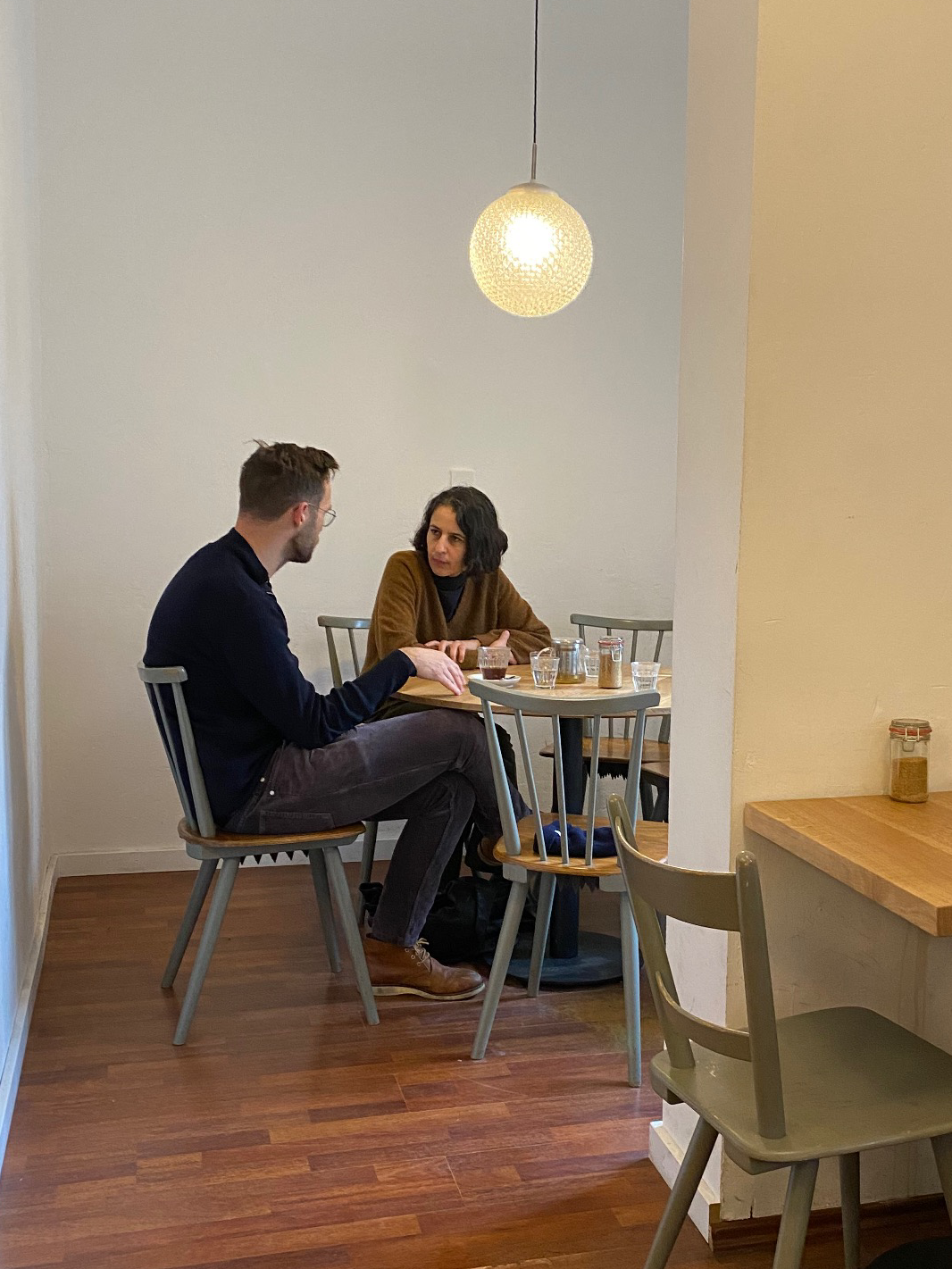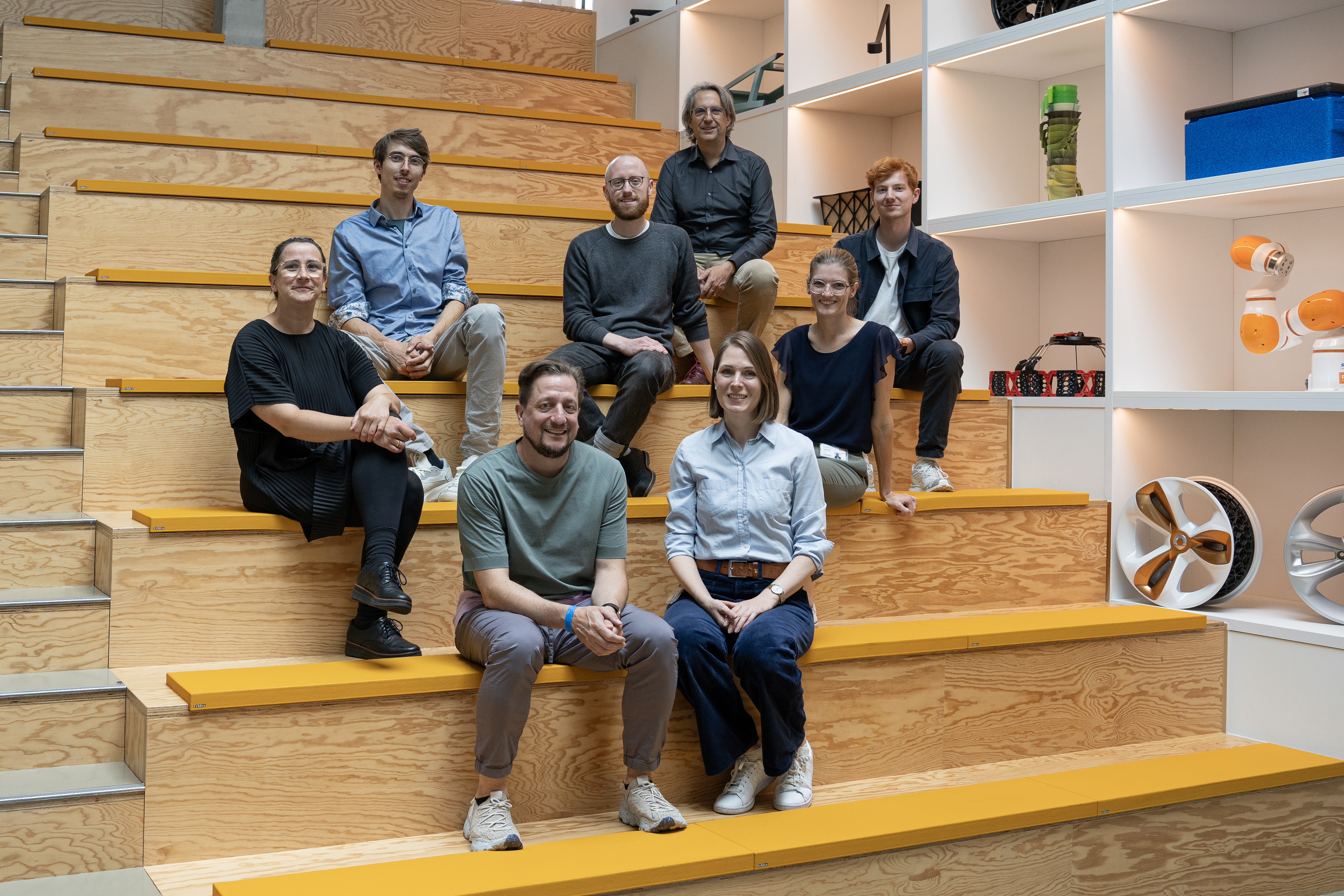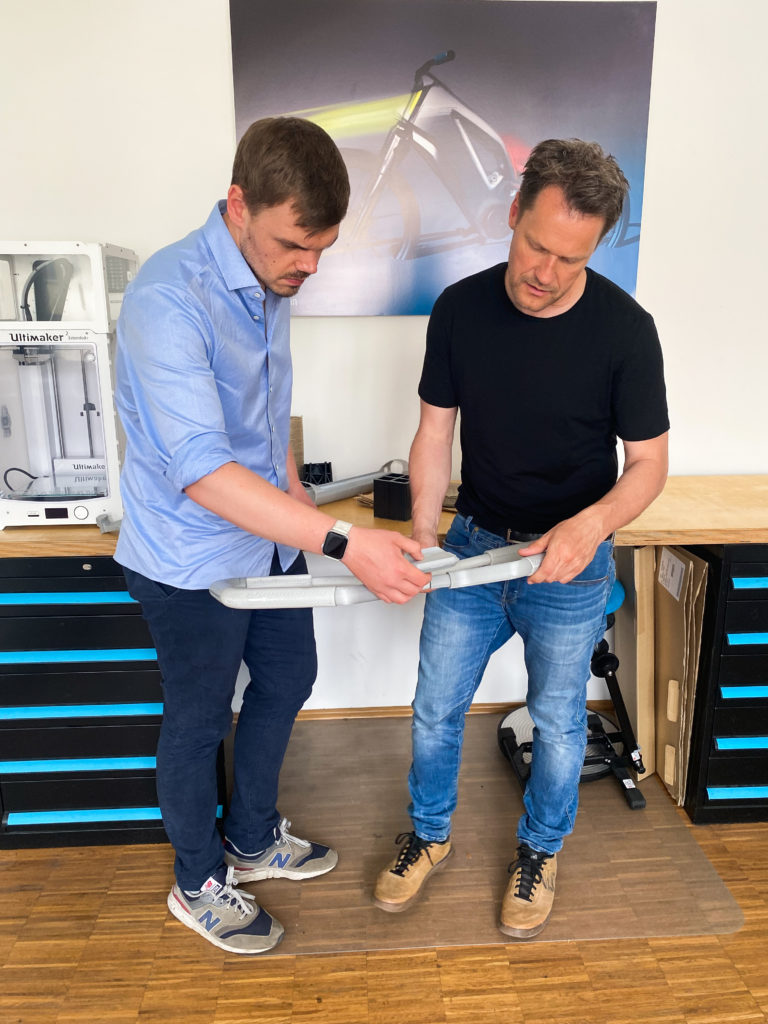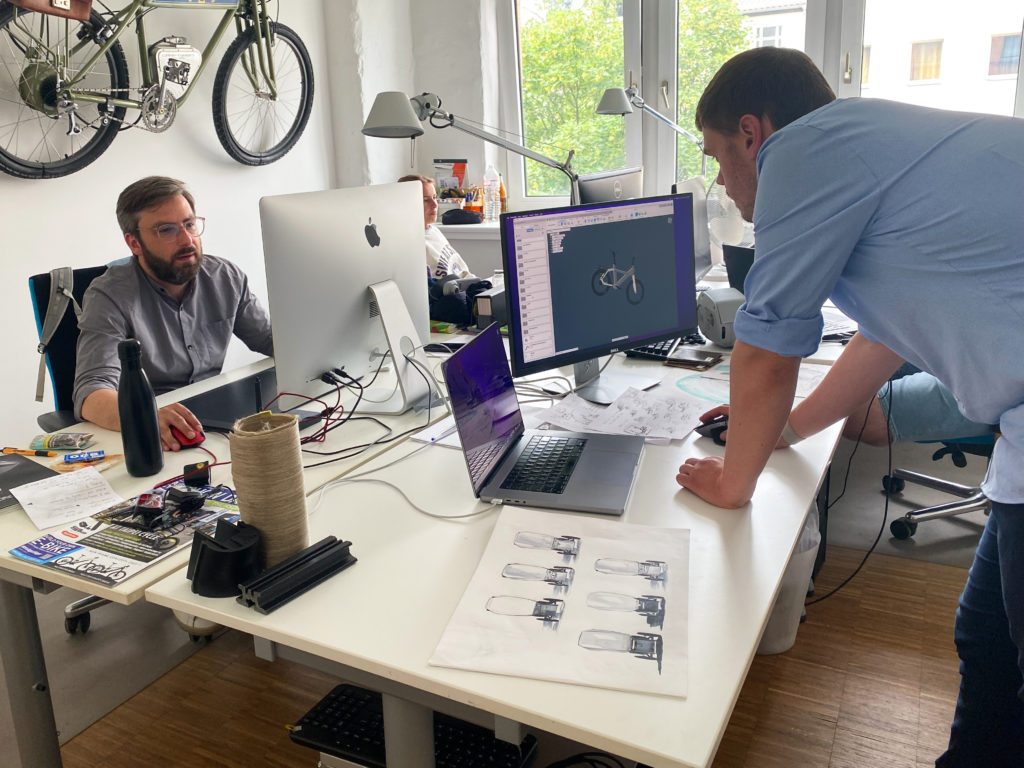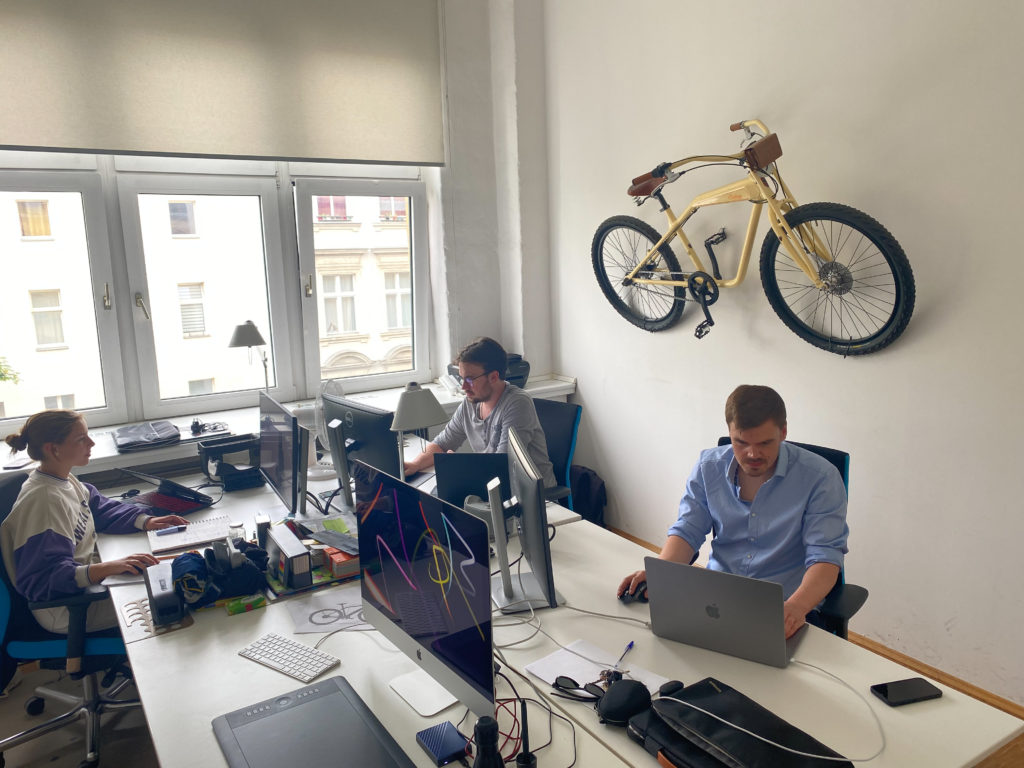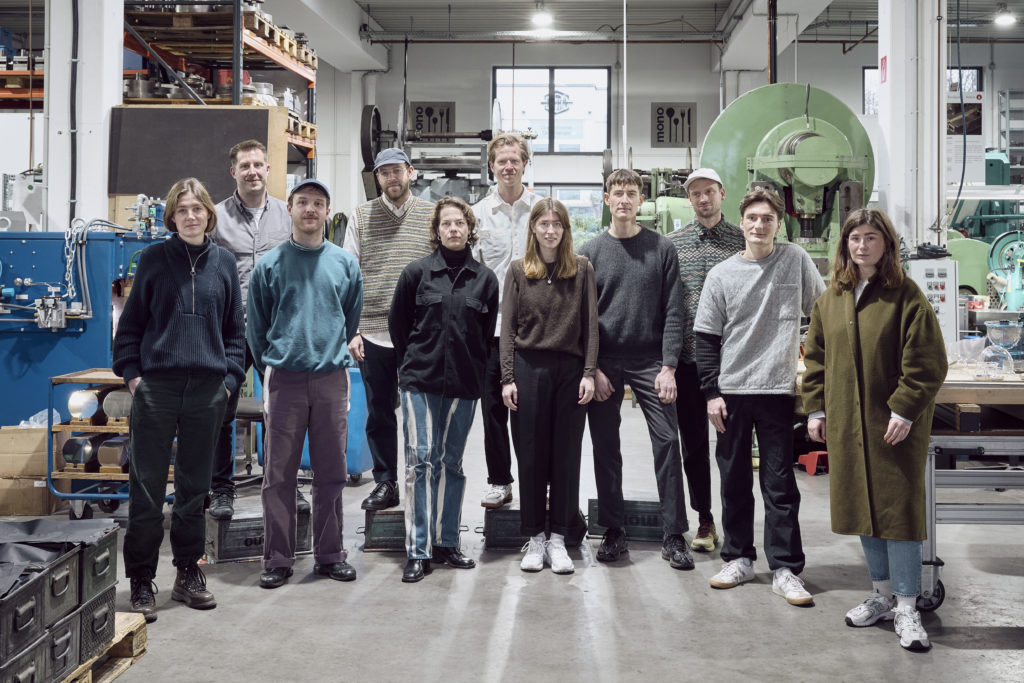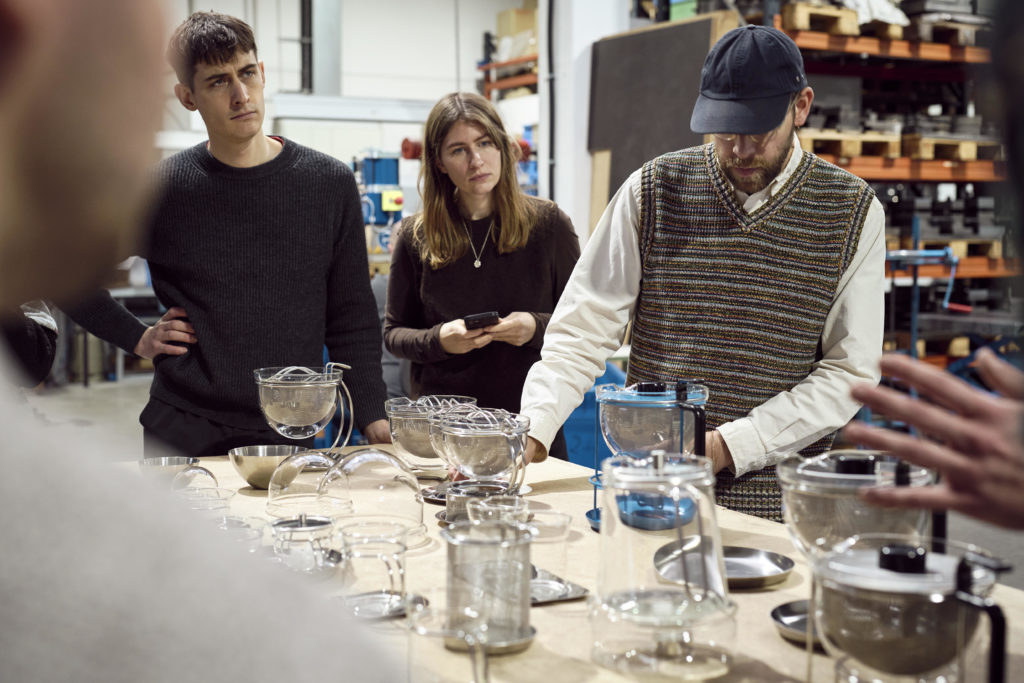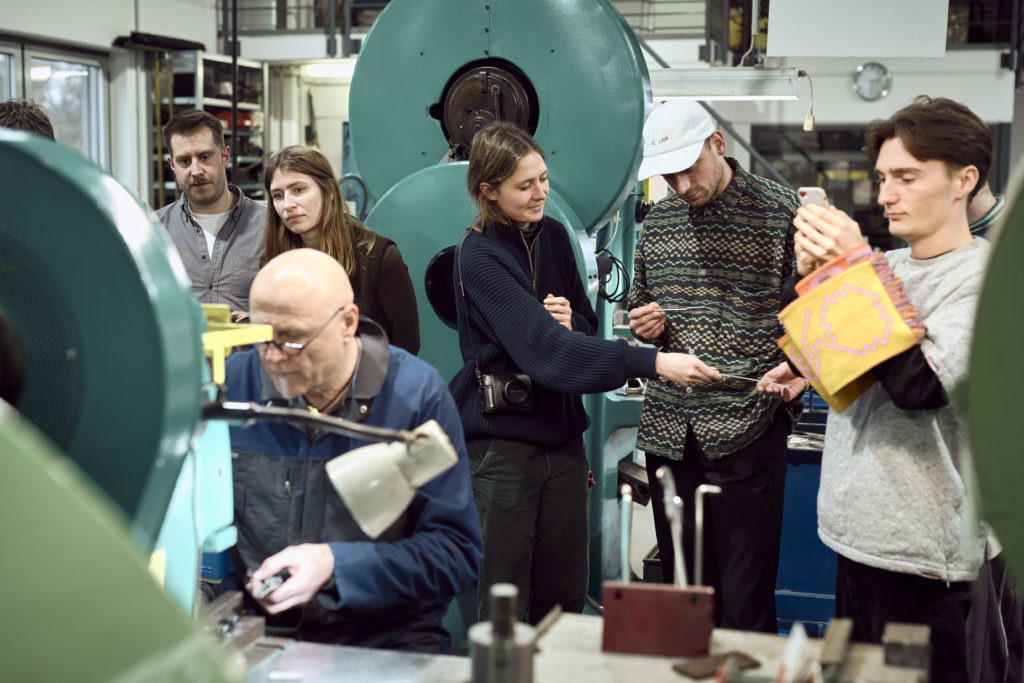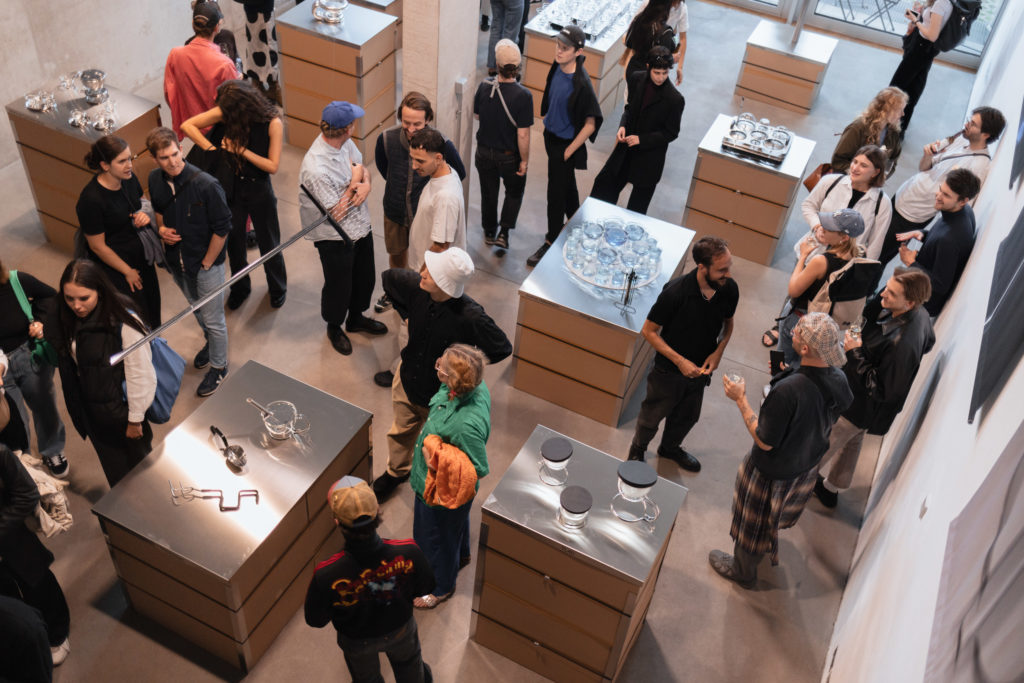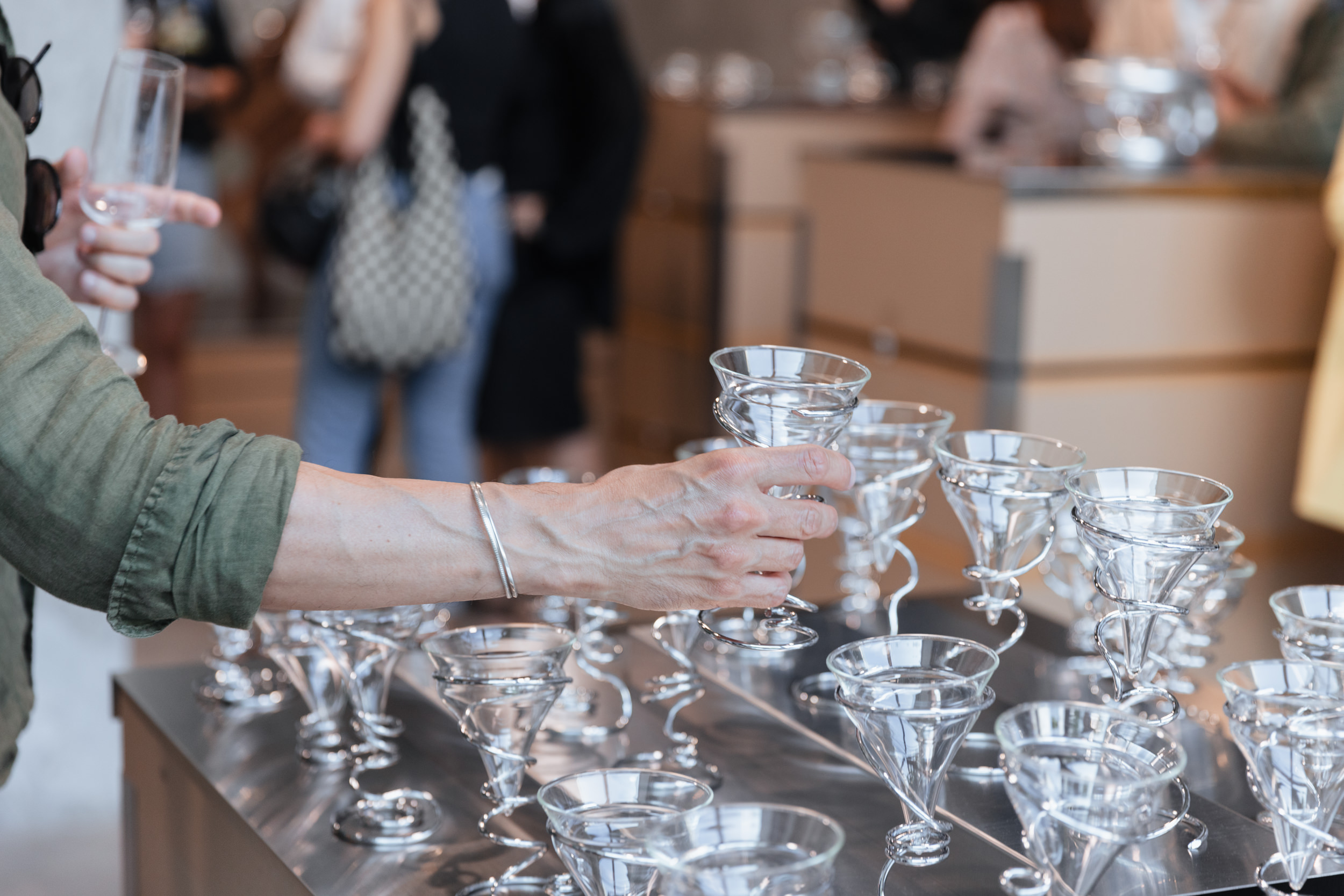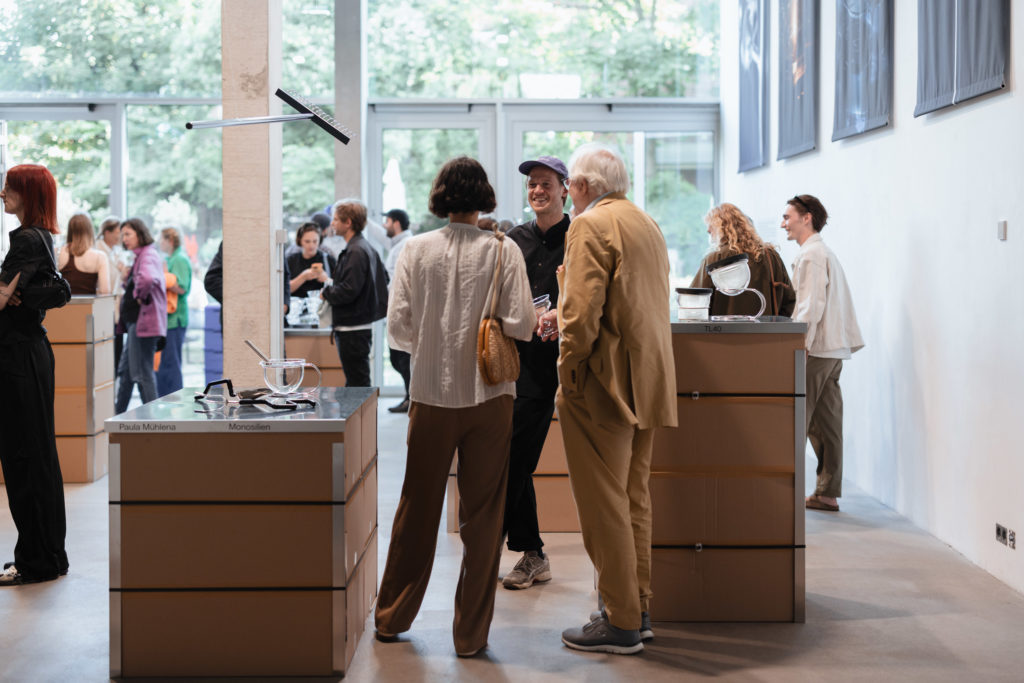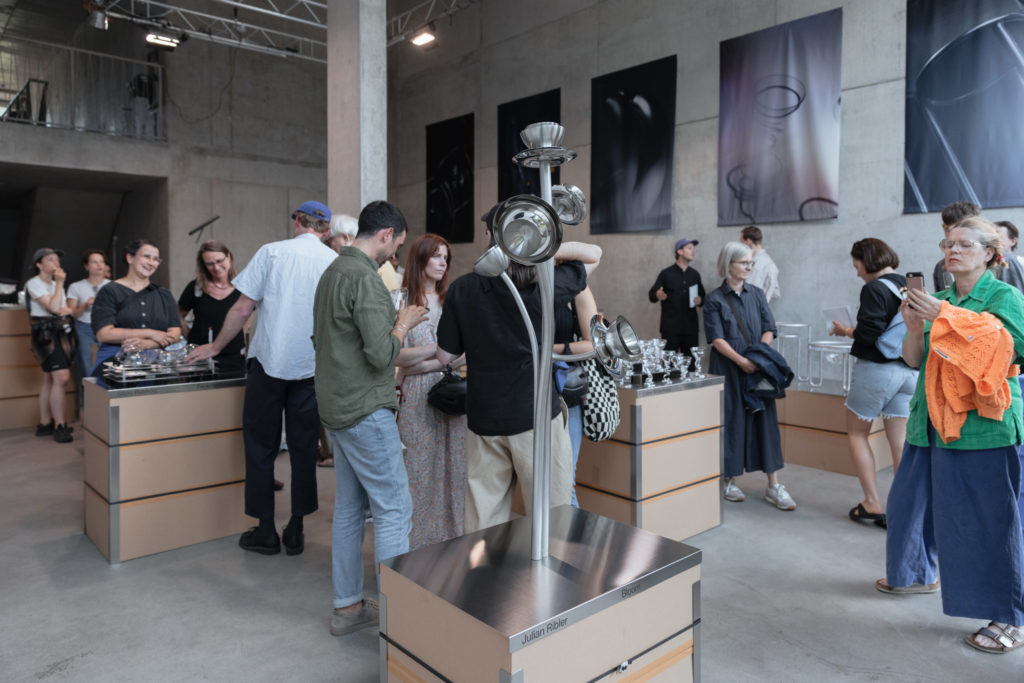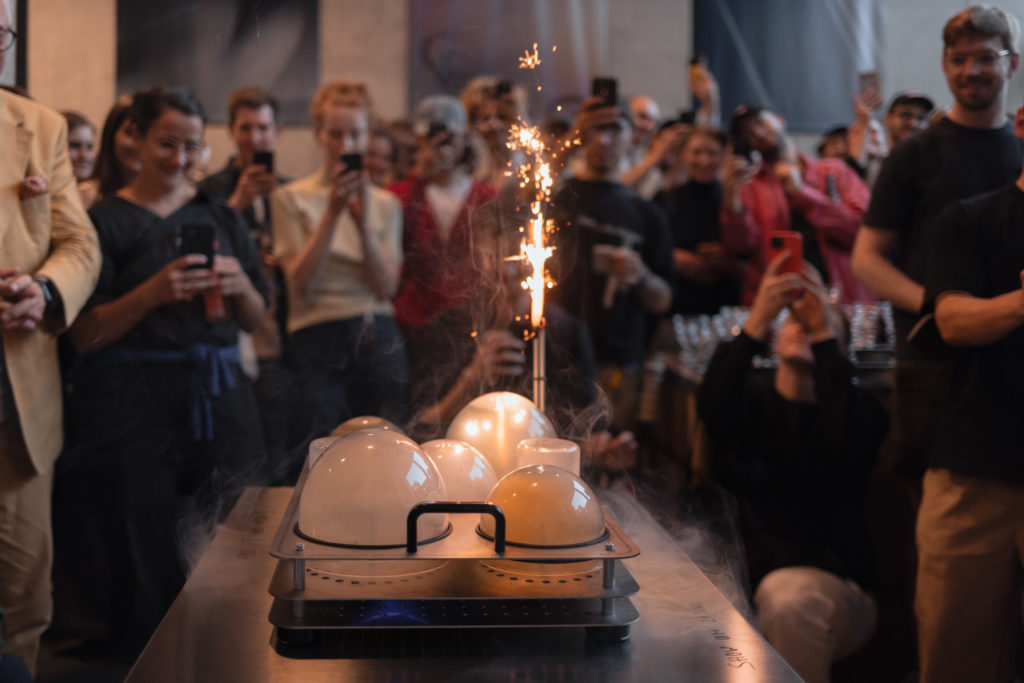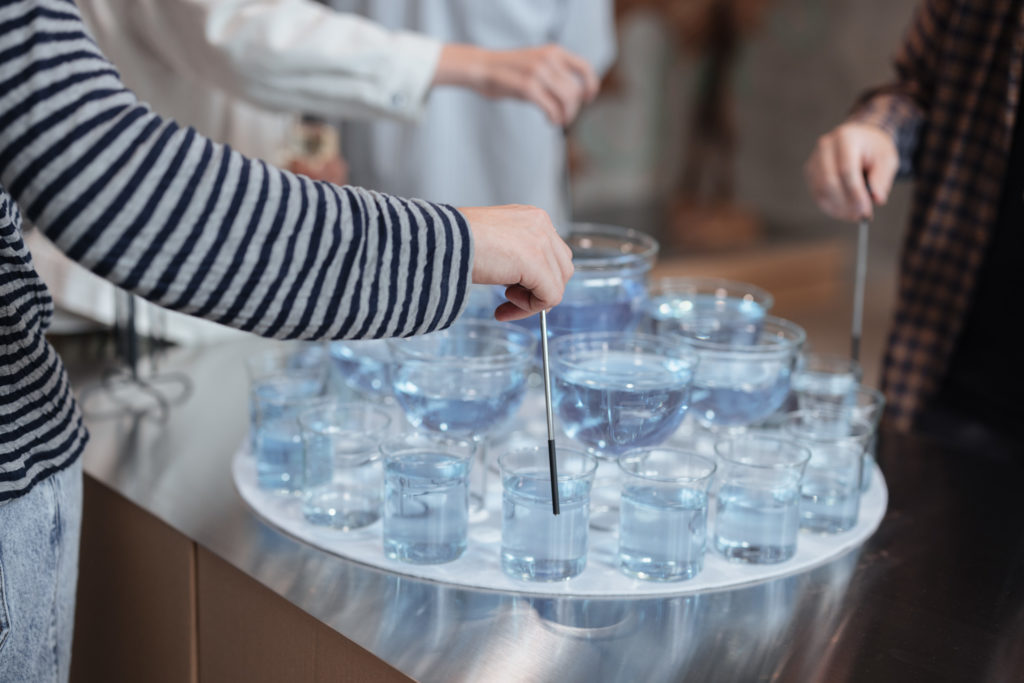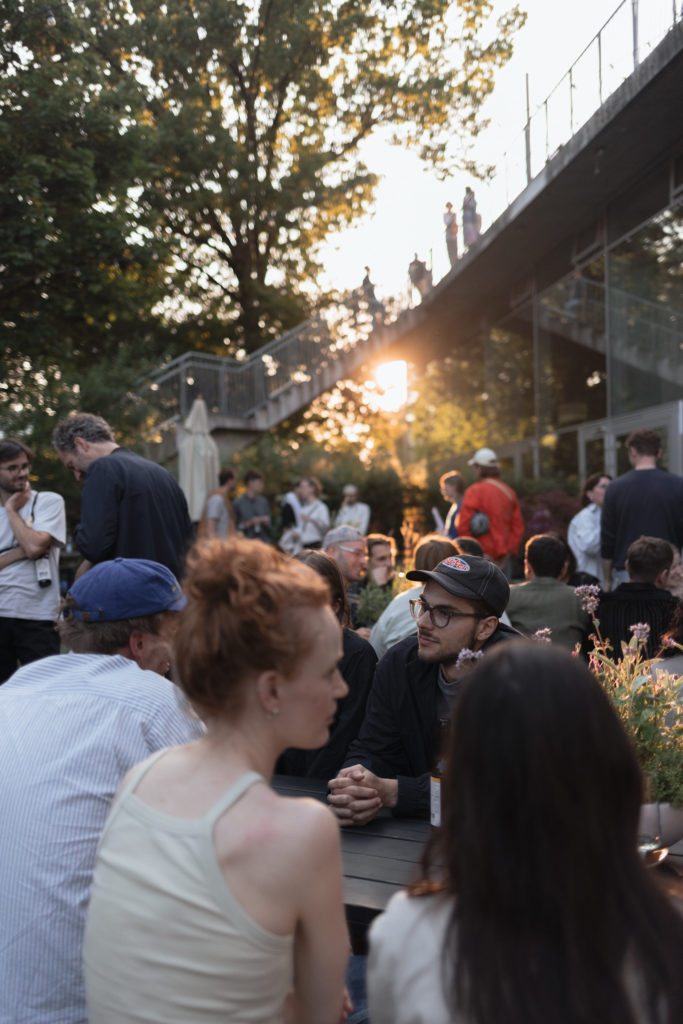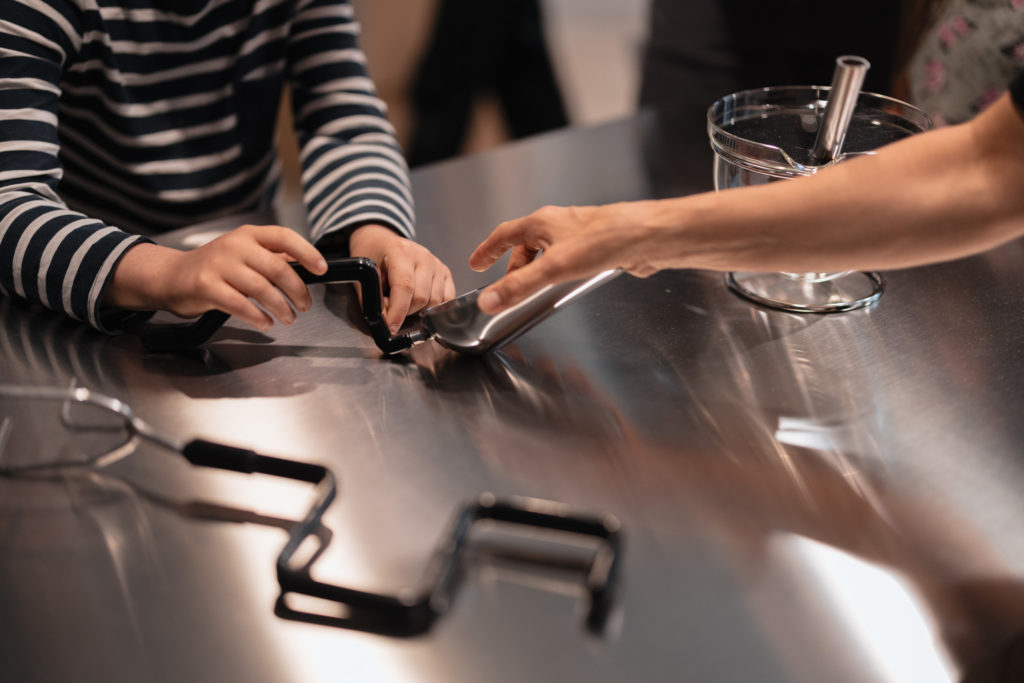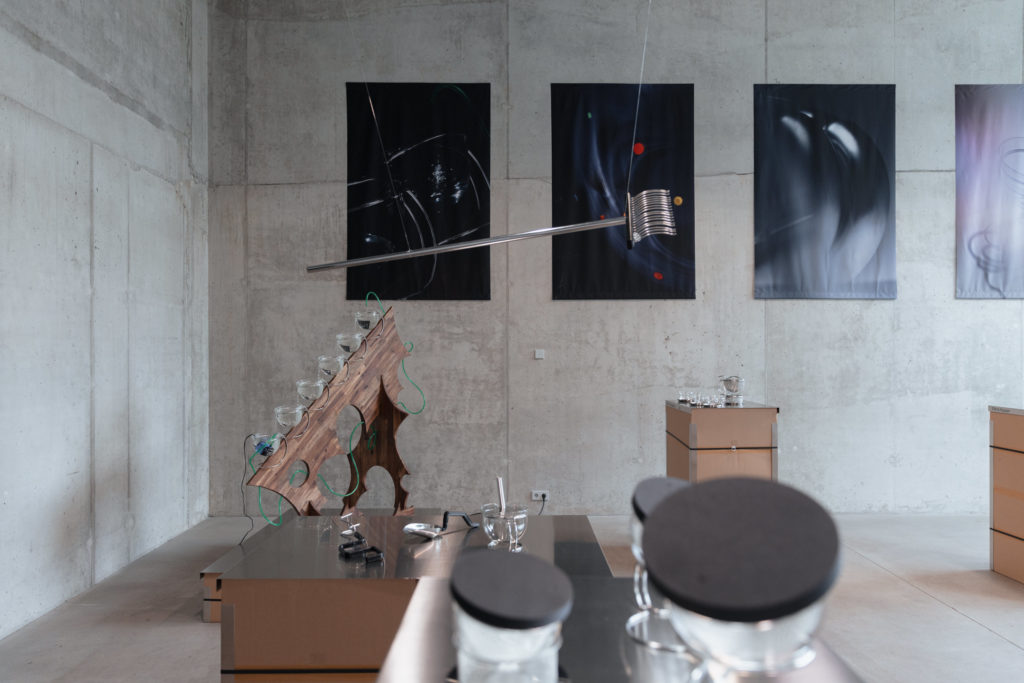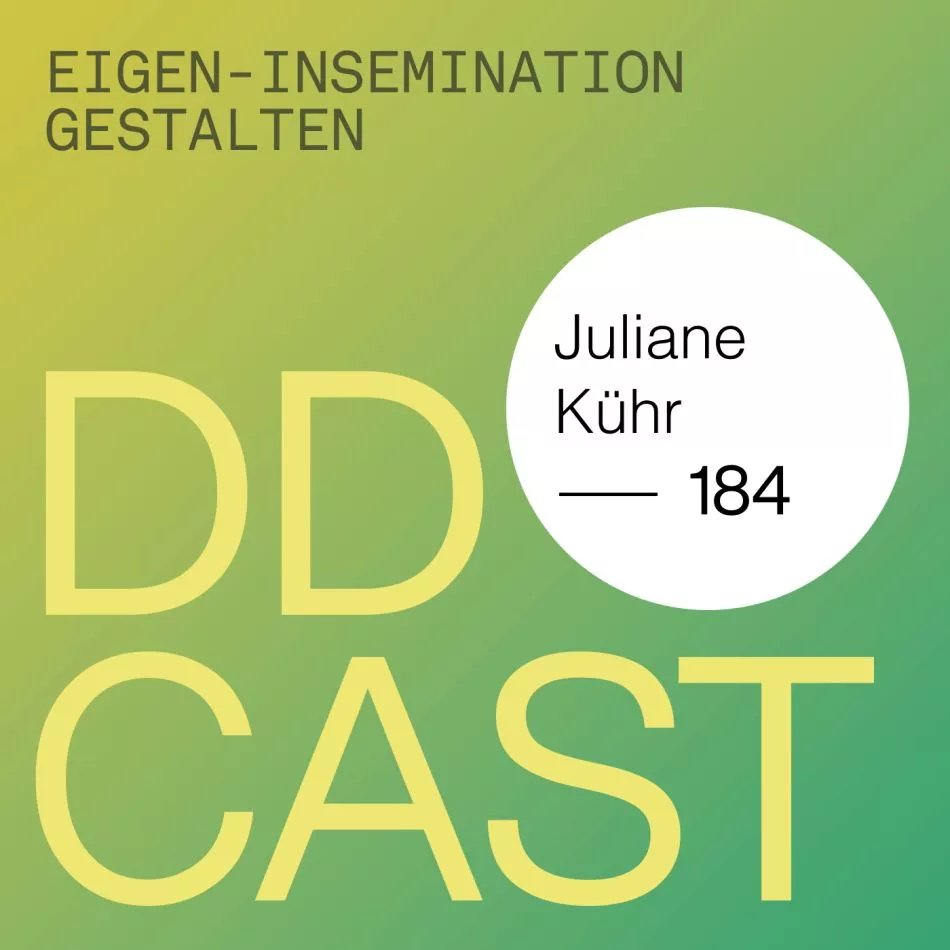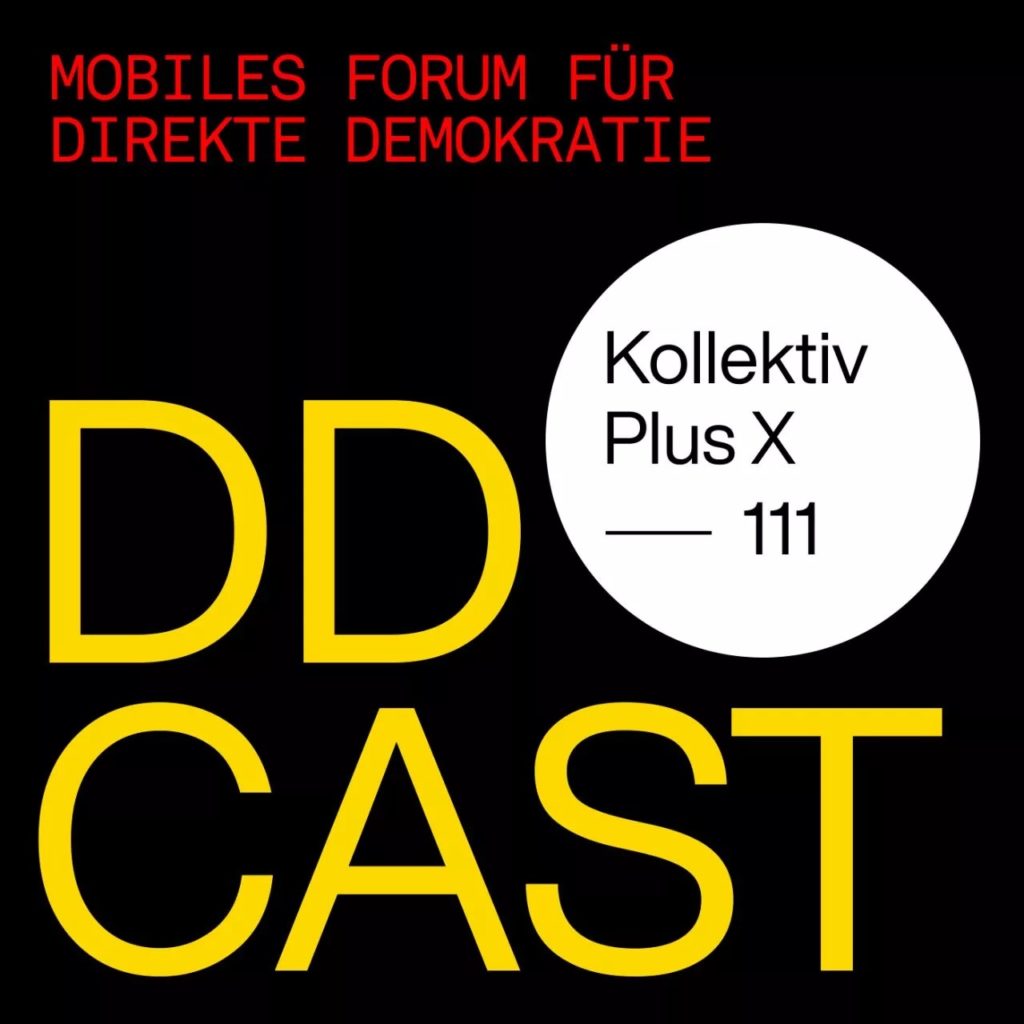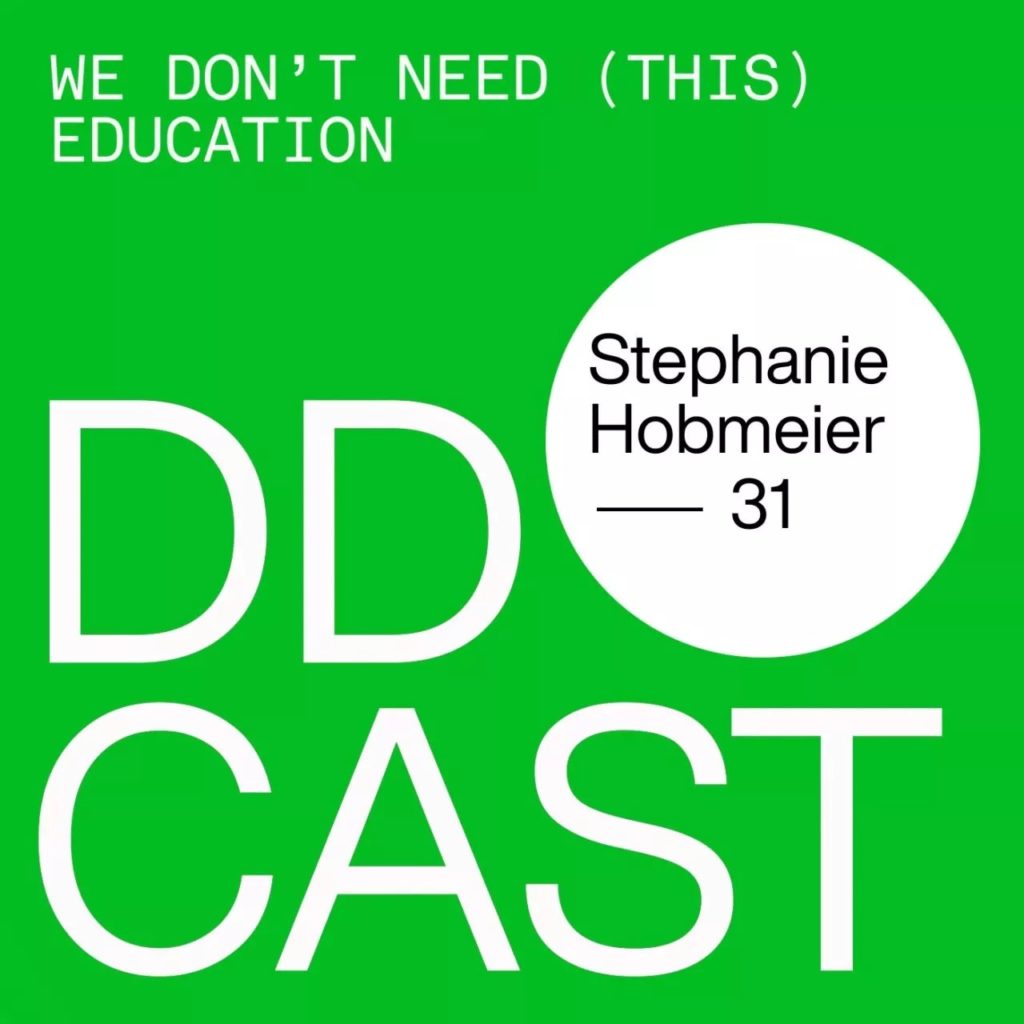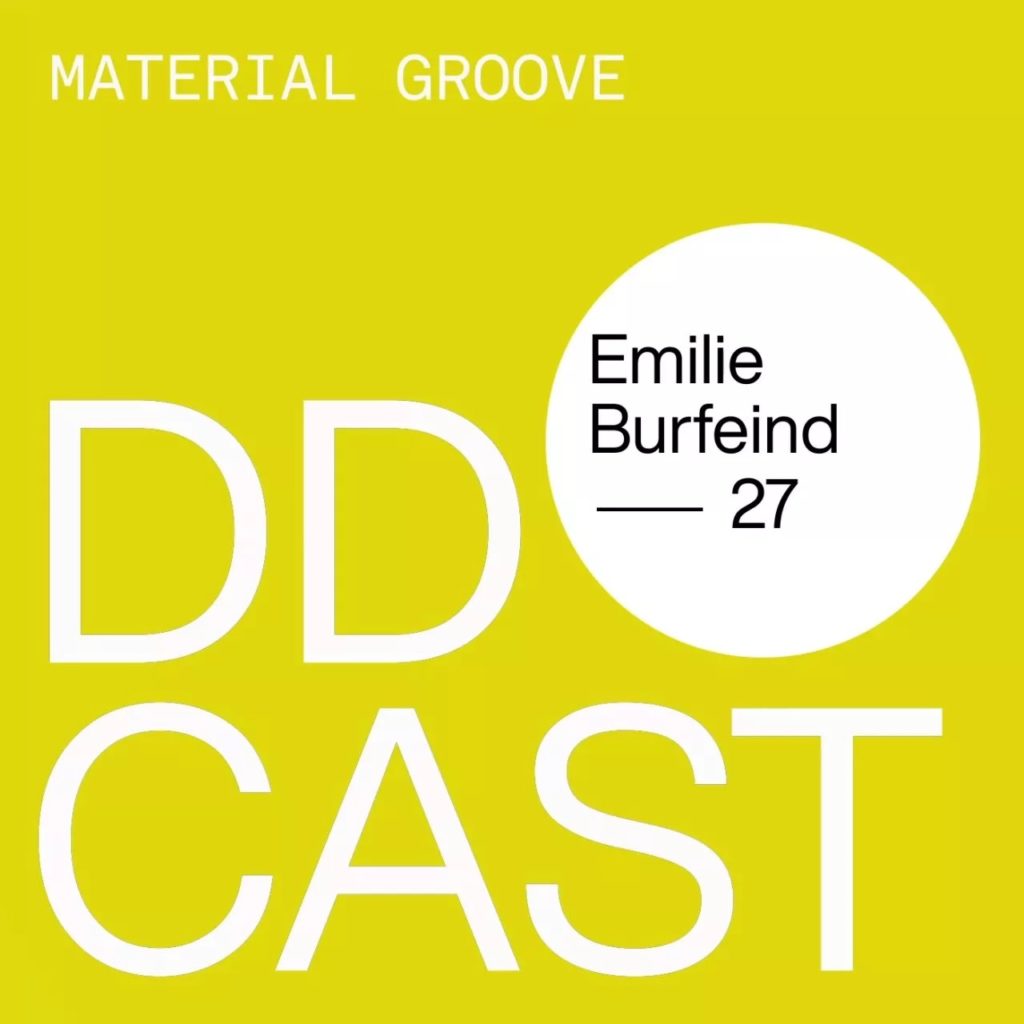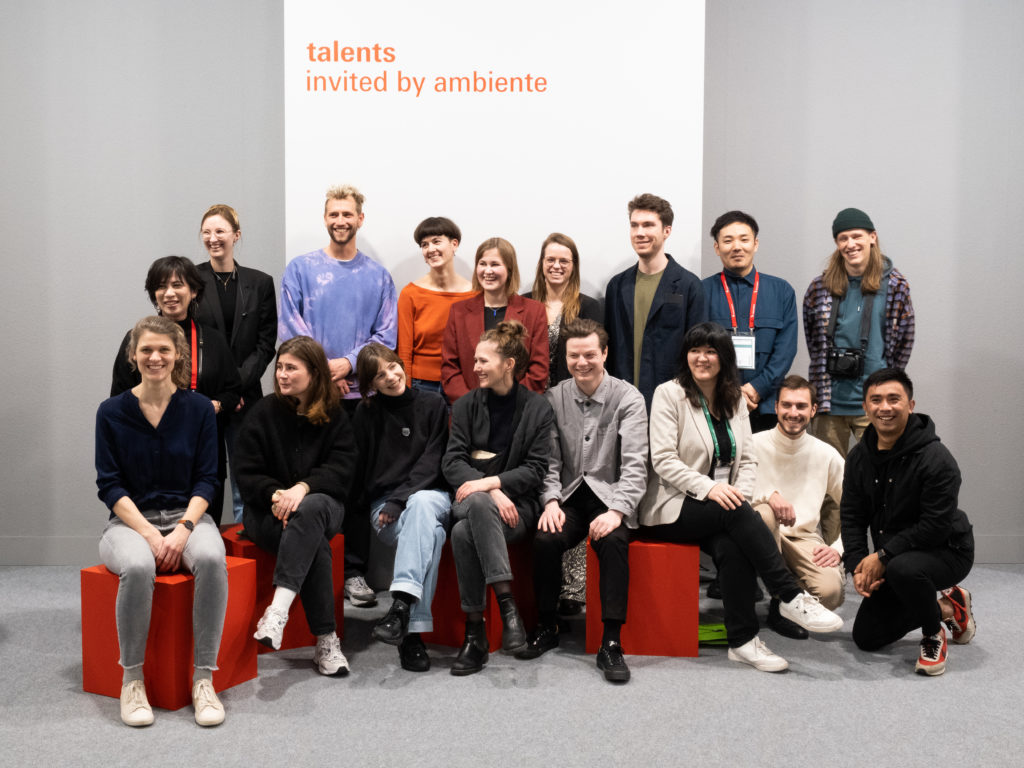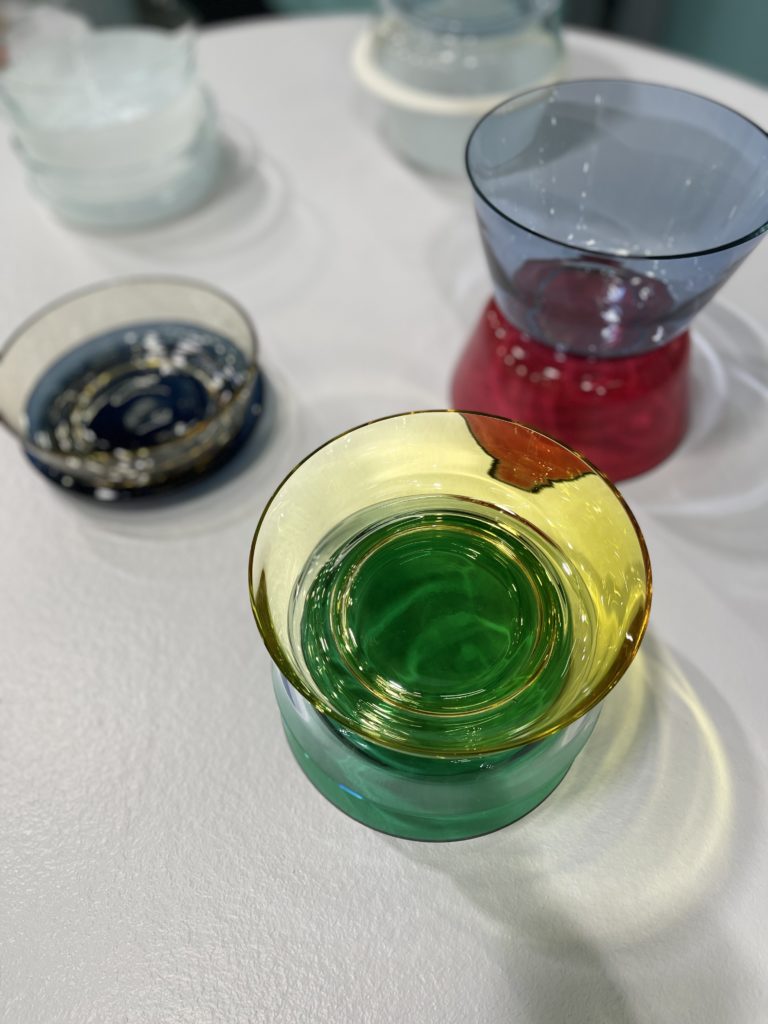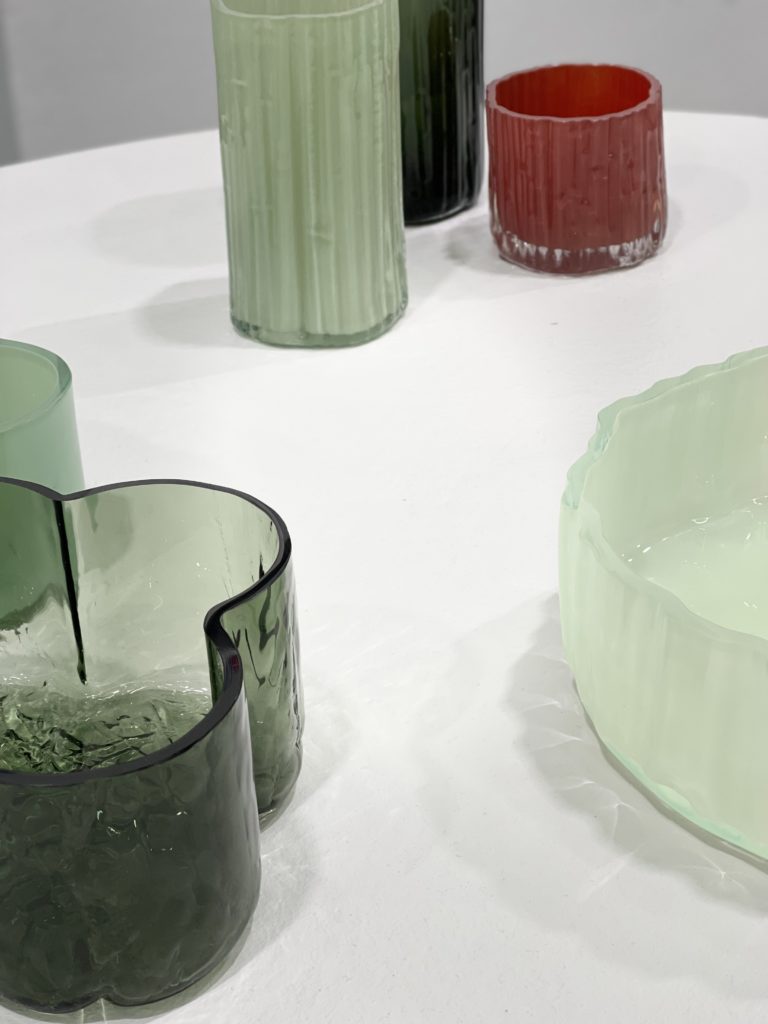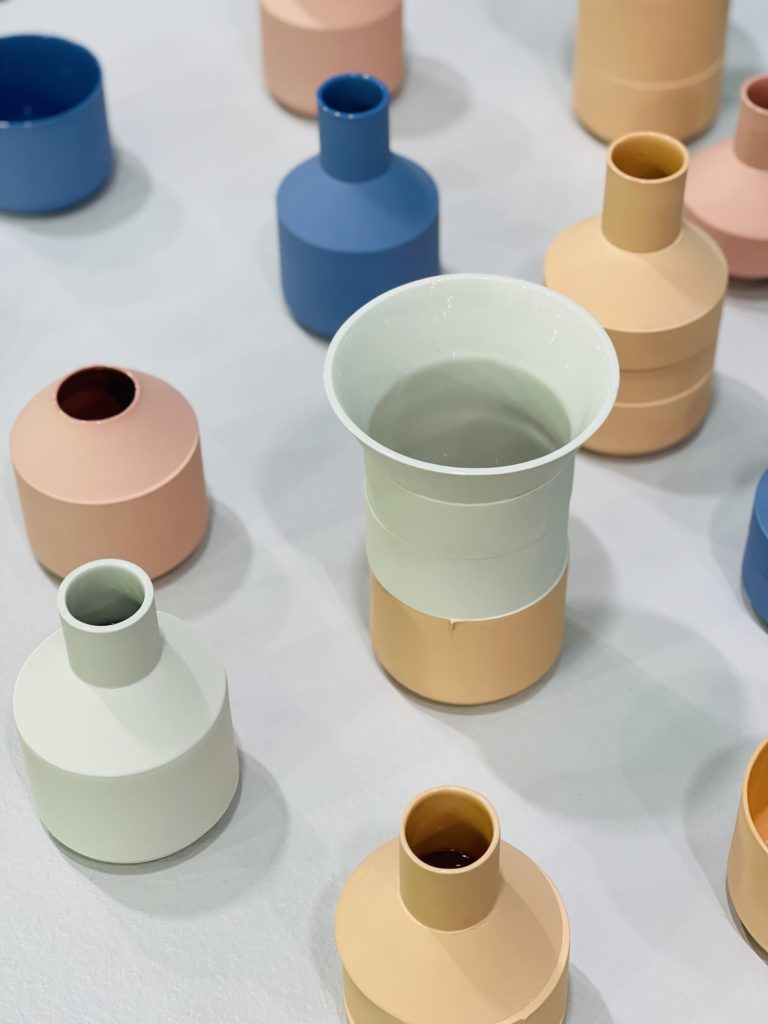Gdg supported by BASF
The three German Design Graduates Hanna Heimbold, Severin Geißler and Johannes Schmidtner were able to gain exciting insights into one of the largest chemical companies in the world during a workshop at the BASF Creation Center Germany in Ludwigshafen at the beginning of August.
As an individual support, Andreas Maegerlein and his team from BASF designfabrik® invited the selected graduates to a two-day materials workshop including board and lodging at the Creation Center, where they had the opportunity to discuss with experts on bio-based and biodegradable plastics, gain insights into manufacturing and processing procedures and exchange ideas with the Creation Center team. In intensive discussions, Andreas Maegerlein, Alex Horisberger and Manuel Ockel from the BASF designfabrik® in the Creation Center Germany talked with the graduates as well as Katrin Krupka, Project Manager GDG and Julia Voigtländer, Division Manager of the German Design Council Foundation about today’s and tomorrow’s plastics and possibilities for design and industry. In the course of this, Hanna Heimbold presented her analysis and development of a design system for positive user experience of variance in monomateriality for recyclable products based on her final thesis Varianz in Monomaterial. Johannes Schmidtner presented Air Craft – the development of a user-oriented design process for inflatables using parametric-based manufacturing methods. Severin Geißler reported on his findings on researching the phenomenon of product transparency using a shoe with his final thesis Spuren Folgen.
BASF designfabrik® in the Creation Center builds a bridge between the visions of designers and the possibilities of plastics, supports customers in the early stages of product development with materials, sample parts and services and works as a control centre in the global BASF network.
Gdg supported by NORBERT Haller / IDBerlin
In July 2023, we had the opportunity to visit the ID Berlin office and talk to Laurin Buchholz and Norbert Haller.
In his bachelor’s thesis “Composite”, Laurin Buchholz dealt with the conception and design of a modular e-bike. With his degree, he has combined two topics – e-bikes and materials. His interest in the use of alternative, sustainable materials as well as optimised manufacturing methods for frame constructions has now become his profession.
Norbert Haller, founder and Managing Director of IDBerlin, supported Laurin Buchholz as part of a GDG mentoring programme and is now his employer. For Norbert Haller, it is always exciting to help young talents find their bearings and future. With his GDG mentoring, he supports bike-loving design talents with vision and very pragmatic tips. For him, the final theses presented at GDG are a door opener.
“Through the final project, you get to know the person behind it very well. But that’s just the beginning …”
Norbert Haller
New people always bring new ideas for the company and make it possible to reflect on one’s own path, which also increases the motivation of the ‘old hands’ to try out unfamiliar paths. And that is essential to be successful in the industry. If young designers are motivated, they have the opportunity to work on projects from A to Z at IDBerlin. At the beginning, there is always a trainee programme lasting several weeks, which IDBerlin has developed with a lot of passion over the years.
ABOUT NORBERT HALLER
As an industrial designer, Norbert Haller has been designing bicycles, pedelecs, e-bikes and e-scooters for international customers since 1998. Today, as a partner of two managing directors of IDBerlin , he develops and works on the future of mobility with a team of international designers in Berlin-Schöneberg.
Interview mit Laurin Bucholz
GDG
Laurin – What’s the job like at IDBerlin and what do you do exactly?
LB
I am part of a small design team and work in different constellations on complex product developments in the bike sector. This can be a frame construction, a detailed solution for a handlebar, or a strategy development for a bicycle in collaboration with research institutes and partners from industry. So it’s quite diverse – it never gets boring.
GDG
When you think about the time right after you graduated – what did you expect from everyday work – for example, did you imagine it to be difficult?
LB
For example, I never thought I would enjoy dealing with customers and suppliers so much. In everyday life, it’s a lot about concrete problem solving in small steps – that’s what I enjoy – working together with many people on a solution.
KK
What did your final project mean to you in terms of your job today?
LB
What’s great is that I can apply the expertise in sustainable materials, modular construction and sustainable manufacturing methods that I acquired in my BA to all projects at IDBerlin in a variety of ways.
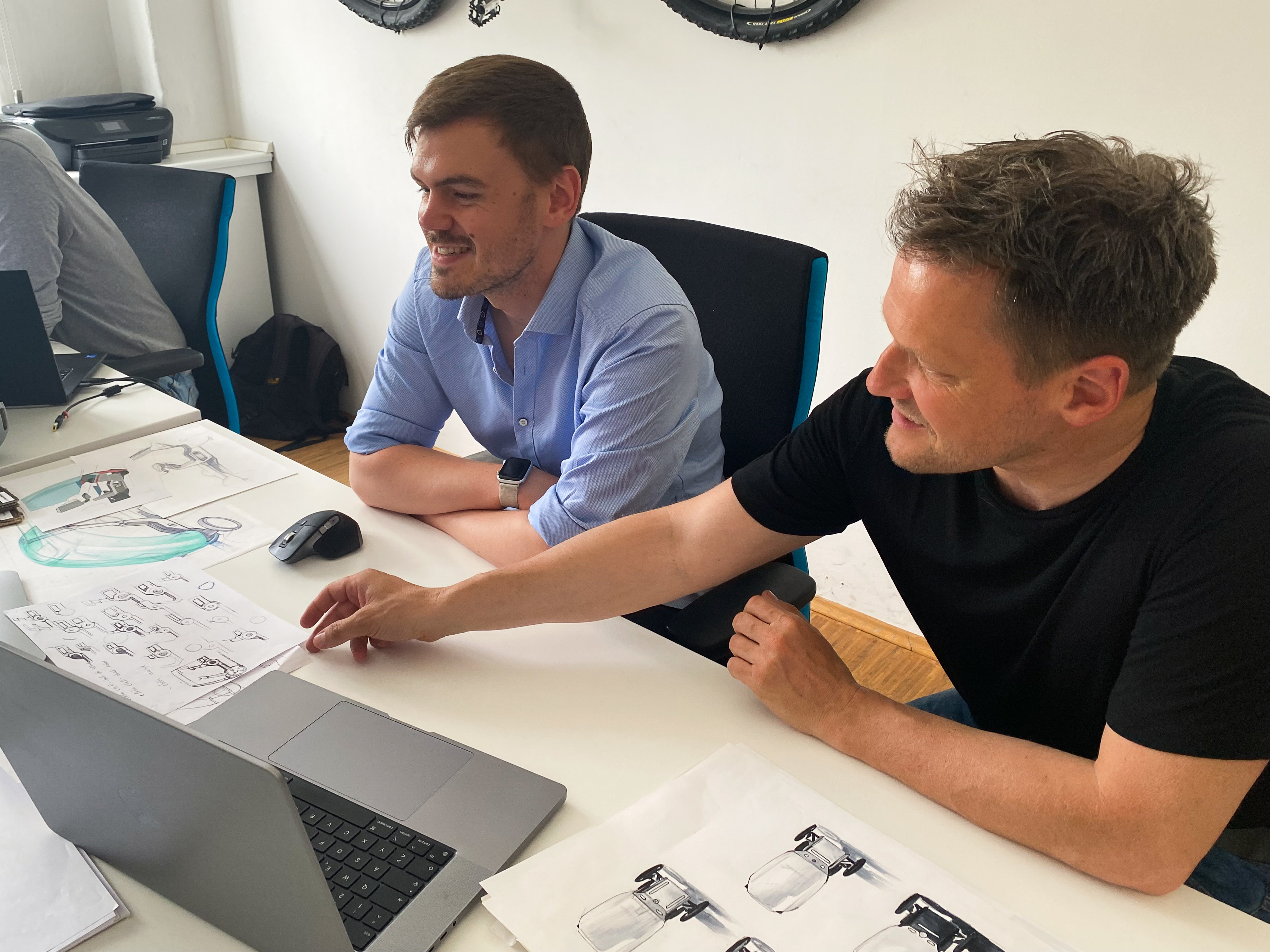
STATEMENT NORBERT HALLER
“Laurin’s expertise has brought us a good deal further in some projects. In particular, his knowledge is being used in a more complex study by a research institution, industrial partners with IDBerlin and Laurin has the opportunity to learn a lot. We work for the market and our designs have to work tomorrow. This requires a lot of specialised knowledge, e.g. on the use of biocomposites or recyclates, recycling of problematic materials, technically feasible solutions with renewable raw materials that meet the high standards of the industry. And knowledge of materials and production is not enough. Of course, it’s essential that you also master all the tools for shaping and understand how the many components work together.”
Norbert Haller, IDBerlin
Gdg supported by Mono
As an ambassador of the German Design Graduates, Mono initiates the “Mono Residency”, which is aimed directly at young designers. The family-owned company has been manufacturing design products for the table at its production site in Mettmann for over 125 years. In 2023, Mono will invite a 10-person selection of the last four graduates (2018-2022) to participate in the “Mono Residency” programme.
40 Years Mono Teapot
In 1983, the company launched the first Mono teapot together with the designer Tassilo von Grolman. It was to become a design icon in the following decades. The Mono Classic teapot was followed by the Mono Filio and Mono Ellipse models, which can also be found in many living rooms of tea and design lovers worldwide. This 40th anniversary is both the occasion and the theme of the first edition of the “Mono Residency”.
New Perspectives
Mono invites the residency participants to play, intervene, deconstruct and recontextualise. By exploring the materials of the Mono teapots and their iconic appearance, the designers develop new perspectives on the classic. The result of the project is ten creative individual pieces – ten art and design objects that take up the materiality and typology of the Mono teapot and stand for themselves through their originality and strong aesthetics.
Mono 4t Exhibition
The 4T Exhibition shows the result of this collaboration: ten art and design objects, creative individual pieces that take up the materiality and typology of the Mono teapot and which stand for themselves through their originality and strong aesthetics.
Photos: Sven Serkis
GDG SUPPORTED BY DDCAST
Together with Dr. Felix Kosok (DDC board), Georg-Christof Bertsch selects graduates for a themed DDCAST production.
The DDCAST from the German Designer Club has now grown to become the most important design podcast in German in terms of content. The number of listens is increasing, especially because the podcast is not a purely conversational format but also deals with topics – and also difficult ones.
DDCAST episodes with graduates as guests (in German)
27 — Emilie Burfeind Material Groove
31 — Stephanie Hobmeier We don’t need (this) education
111 — Kollektiv Plus X (Ezra Dilger, Marvin Schwark u.a.) Mobiles Forum für direkte Demokratie
About DDCAST
DDCAST, the podcast of the Deutscher Designer Club (DDC), is one of the leading design podcasts in Europe. The programme policy is characterised by a consistent opening of the “design bubble” towards adjacent disciplines. The guest list is strictly gendered and divided into three groups, up to around 30, up to the mid-40s, from the mid-40s onwards, geared towards the equality of generational perspectives.
GDG SUPPORTED BY AMBIENTE 2023
The innovative ideas and future-oriented concepts were represented with numerous Talents areas, at the GDG special areas, at the special area Circular Materials for Future Dining by Haute Innovation as well as at the stand of the German Design Award newcomers.
STATEMENTS FROM THE EXHIBITORS
It was great to be able to exhibit at the Ambiente Talents Programme and present my designs to an international audience. The feedback was very appreciative and motivating, I was able to make some international and exciting contacts and it was very inspiring to exchange ideas with other young designers. The Talents Programme is really a special opportunity and platform to get in touch with representatives from the whole industry.
Julia Huisken
Ambiente 2023 was a wonderful and exciting experience for me, as I had never before experienced such a large trade fair with so many visitors. One thing I have learned is definitely to print more postcards next time! Besides making new contacts, the conversations with interested visitors were particularly enriching. Their questions, thoughts and perspectives on my work opened up new perspectives of an economic, ecological and creative nature for me with regard to future implementations.
Dagmar Christina Gerke
It was a special experience to present your work to an international audience during Ambiente 2023. The discussions held there, whether with other designers or industry representatives, were very inspiring and revealed promising possibilities for the future. I am also glad that I was able to exhibit with such talented young designers.
Theresa Voigt
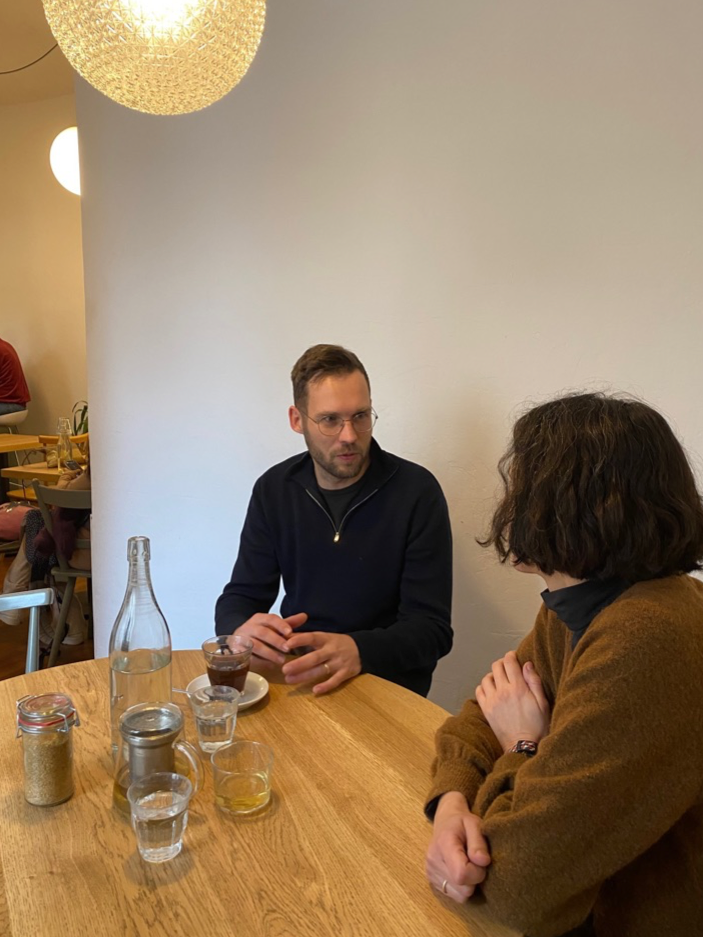
GDG SUPPORTED BY Jasmin Jouhar
For many years, young design has been one of Jasmin Jouhar’s favourite subjects. She knows exactly how important it is for graduates to be able to present their work to a larger audience.
Since 2019, Jasmin Jouhar has been supporting graduates with individual PR coaching and advising on topics related to media visibility. Topics such as non-academic writing and visual language or media and social networks are often neglected during studies, but quickly become very important after graduation, especially if a graduate is working towards self-employment or a start-up.
Jasmin’s motivation is: “To give back some of the support I have experienced over the years. On the other hand, I have acquired knowledge and skills through my work that I would like to share. If I can make it easier for young designers to make the difficult transition to work and self-employment, all the better!
Statement Jasmin Jouhar
In the conversation, Milan and I talked about visuals, PR and social media. But above all, it was about the structure and content of his website, which will soon go online. These are questions like: How do I communicate my attitude and the content of my work to certain groups of people?
Jasmin Jouhar
